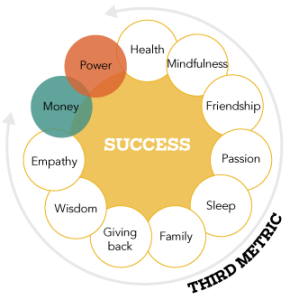Redefine Success – The Third Metric
 A Huffington Post article and infographic (below) encourages us to redefine success, re-think what it means, and reassess our priorities, possibly leading to jobs that we really WANT to be doing.
A Huffington Post article and infographic (below) encourages us to redefine success, re-think what it means, and reassess our priorities, possibly leading to jobs that we really WANT to be doing.
Just 30% of full time workers are engaged at work, while half are uninspired, and another 30% simply “roam the halls” spreading discontent. Some call this presenteeism. Either way, there’s a personal and economic cost.
According to Arianna Huffington, “We’ve all bought into this male definition of success, money and power, and it’s not working. It’s not working for men, and it’s not working for women. It’s not working for anyone.”
Update: That was also the message of her TED Talk on The Need & Positive Effects of Restorative Sleep and her new book, THRIVE.
That’s where their Third Metric infographic comes into play. After the Redefine Success graphic I list some of the key points, as well as related statistics from a similar infographic on sleep. With that summary, even blind people using screen readers can “see” the data too.
KEY POINTS
The American workforce is tired. More than 80% of workers report chronic job-related stress, and their employers feel it too. Stress costs businesses hundreds of billion of dollars each year when people are too tired to do their jobs well or come to work at all.
Stress and the lack of sleep are directly related, and a Harvard study found lost worker productivity of $63 billion per year due to insufficient sleep.
But there’s also a personal toll, and since I found no study of that, I developed an Excel spreadsheet model to estimate it myself. With conservative assumptions, the projected lifetime value of good sleep exceeded $8 million in increased earning capacity and reduced healthcare costs, due to things like improved alertness, attention, attitude, creativity, critical thinking, memory, and personal relationships.
REDUCE STRESS
- $300 billion is the estimated workplace cost from absenteeism, presenteeism, down productivity, worker turnover, medical & legal fees, and insurance.
- Stress and anxiety cause more workers to be absent than physical illnesses do.
- Workplace stress has been linked to: high blood pressure, faster aging, diabetes in women, and depression.
- Stress takes its toll. 75% of workers report physical symptoms of stress, but 57% don’t use their allotted vacation time to de-stress.
REDEFINE SUCCESS
Success can be defined in many ways, but most Americans no longer consider money and power as top priorities. Here’s how they see it:
- Good Health (85%)
- Finding Time for Important Things (83%)
- Having a Good Marriage / Relationship (81%)
- Knowing How to Spend Money Well (81%)
- Having a Good Work/Life Banance (79%)
- Having a Job You Love (75%)
- Making Time to Pursue Passions (69%)
- Being Physically Fit (66%)
- Embracing New Experiences / Changes (65%)
- Trying to Learn and Do New Things (65)
- Having a Lot of Money (just 33%)
RELAX AND SLEEP
- Adults need 7-9 hours of sleep per night, but 60% of us average 6 or less.
- The more cash-rich working Americans are, the more time-poor they feel. (2011 Gallup poll)
ALERTNESS
- Reducing nighttime sleep by 1.5 hours impairs alertness by 32%, the cognitive equivalent of 0.10% blood alcohol content.
- Drowsy driving causes more than 100,000 automobile crashes, 40,000 injuries and 1,550 deaths each year (National Highway Traffic Safety Administration)
- 60% of drivers admit to driving while drowsy. 37% of drivers have fallen asleep at the wheel.
- Doctors with less than 6 hours of sleep between procedures have twice the amount of surgical complications.
- CDC says a whopping 11% of kids have been diagnosed as having ADHD, but evidence suggests that many cases are, in fact, a sleep disorder.
DISEASE
- Sleeping 6 hours or less increases chance of heart disease by 48%.
- Women sleeping just 6 hours have 62% higher risk of breast cancer.
- Women doing shift work for more than 20 years experienced 58% higher risk for Type 2 diebetes.
OBESITY
- Sleeping just 6 hours increases risk of being overweight 27%.
- Sleeping 5 hours increases this risk to 73%.
- Sleeping 4 hours causes 22% increase calorie consumption.
NAPPING
- If sleeping more isn’t an option, take a nap, since cognitive funtionality increases 40% after a 20 minute nap.
- A 30-minute nap three times a week lowers the risk of heart-related death 37%


One Comment